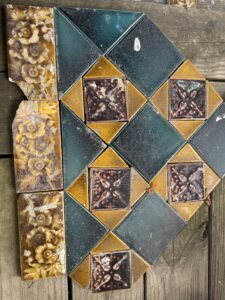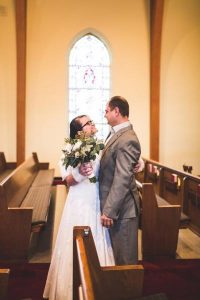
I’ve been thinking a lot about listening recently. If you’ve been on the home page of my website, you’ve seen the new graphics that capture what I’ve been thinking. What are good listening skills? How can I hold true to my beliefs and still be a good listener?
A photo of Marnell and I three years ago while dating reminded me of my initial confusion about my now-husband, and the unexpected person who settled the question in my mind.
I didn’t know much about Marnell, other than that he had lost his leg as a child and walked with an artificial leg. (I am hoping Marnell will talk about this sometime on a special public episode of Voices of Survival. We’ll see!) Even though I knew the loss of his leg didn’t reflect badly on his character, I didn’t know what to think about it.
One day in the hospital, I encountered Dr. Russell, the neurologist. We were in the hallway outside the heart surgery operating rooms as I recall. As the automatic doors opened and shut and food and lab carts rattled past, I took the chance to ask him what he thought about this man named Marnell.
Dr. Russell’s Three Good Listening Skills
- First, he asked questions.
Notably, he wanted to know what Marnell had done with his life. Is this a man who pitied himself and stayed on the couch watching video games because he could no longer compete in foot races?
So I told him how Marnell helps people. His neighbor with the childhood brain injury who loves scooters and bikes.His family. The children 22 hours north in Ontario where the blacktop road ends.
- Second, he listened.
This may seem obvious, but it can’t be understated. A neurologist, making rounds on his hospitalized patients, the sickest of the sick, stopped and listened. Additionally, he had the reputation of being a listener or I would not have bothered asking.
- Third, he gave a simple observation about what I had said that cut to the heart of truth.
“It sounds to me,” Dr. Russell said, “that what we might consider his handicap has become an attractive trait. Because of his loss, you already know how he responds to adversity. Instead of focusing on himself, he reaches out and helps others. That’s far more significant to know about a life partner than a physical trait.”
His response flipped my thought process on its head
I had been trying to decide if Marnell’s handicap was a negative.
I don’t doubt that I would have realized in time that it was not. But Dr. Russell’s good listening skills and succinct appraisal stunned me with its simplicity. It brings tears to my eyes even today as I think of how he saw through what I had not seen. How all the pain and all the losses that Marnell had experienced had not had the power to destroy his faith in God or to make him inner-focused.
I’m not trying to make Marnell out to be perfect. You should see his office! (Sorry, Dear.) But he is a superb life partner who loves God. He listens to those around him, and loves an emotional, dreamy writer woman well. I wish for his sake that he still had both legs. I dream of the day that we will all put on new bodies, imperfections forever gone. In the meantime, though, I’m so glad I have him in my life.
And the person who clinched my feelings about that was someone with good listening skills, to whom I will be forever grateful.










4 thoughts on “How A Neurologist’s Good Listening Skills Gave Me Confidence In Dating”
I missed this one and so I am late in response but I did really enjoy the Dr’s insight. Glad you followed his advice 😉
I am too! Thanks Sheila.
Awww!!!! If this isn’t just the sweetest story.
Thanks for sharing t his part of your journey! Isn’t it amazing how one’s words can make a marked difference in our lives! It can either be positive as it was for you in this case or it can be a negative experience which haunts folks for years! Yes words are powerful!